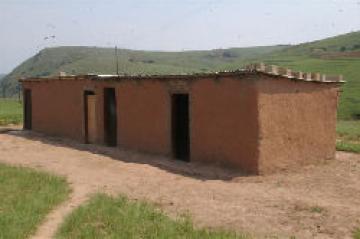Pupils still learn in stick and mud classrooms

MBITA - At this day and age, there are still pupils who take their lessons in stick and mud primary and secondary schools.
The school’s plight was carried by the Swazi News about three years ago. Pupils of Mbita Primary and Secondary Schools attend classes in extremely dilapidated classrooms with perforations that expose them to all kinds of unbearable weather.
The over 200 pupils are taught in a single stream set up where blackboards are peeling off in the classrooms. The roof in most of the classrooms is completely worn out and ‘threatens’ to collapse on the pupils anytime.
The pupils are also forced to sit on concrete blocks and place their notepads on their laps when doing class work. There are only two blocks made of concrete and only one is partially complete while the other one needs roofing and windows.
The new block came as a donation from former Gege MP Mbongiseni Malinga who offered 3 000 blocks and 15 bags of cement for the construction of four classrooms. Due to the school’s location at this sparsely populated poverty-stricken and mountainous area, pupils and teachers are forced to walk for over 30 kilometres to and from school.
The hungry pupils are fed with porridge and beans provided by World Food Programme, which has since cut the ration and made the pupils’ lives more difficult.
There is no public transport that can take them to school because of the poor road network. Only big four-wheel drive vehicles can travel on roads in the mountainous area to reach the school. What further exacerbates the situation is that officials at the school, which was established through the help of the Church of Christ, feel neglected by government and donors.
difficult
The principal, Patrick Mango, said theirs was nothing but a difficult life that was even difficult to imagine. "We survive through God. We have only seven teachers at the primary school who are all working on temporary basis. They are under the government’s payroll. We can’t stop thanking the teachers for their commitment," he said.
He said parents, despite living under devastating poverty, had also contributed to the livelihood of the school.




 del.icio.us
del.icio.us Digg
Digg